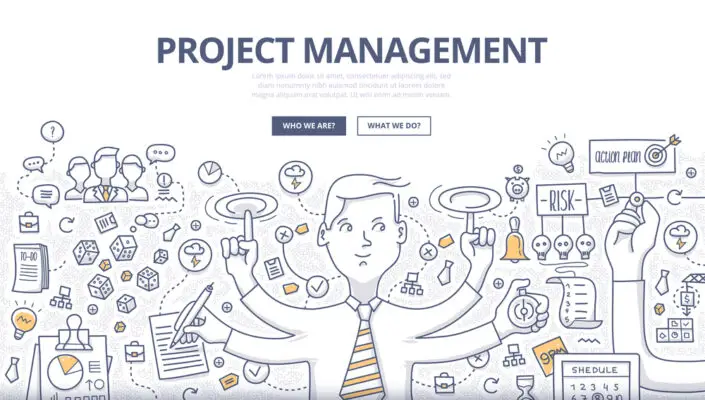Project management professionals can find opportunities in the growing field of online publishing. With the rise of digital platforms and the increasing demand for online content, there is a need for project managers who can oversee the planning, development, and delivery of digital publishing projects.
These projects may include website launches, mobile app development, content management systems implementation, and online marketing campaigns.
Project managers in this field need to have a solid understanding of digital publishing technologies, as well as strong leadership and communication skills to collaborate with cross-functional teams and stakeholders effectively.
The publishing industry offers a wide range of exciting opportunities for project management professionals to showcase their skills and contribute to the success of various publishing projects.
In the realm of project management, the role of a project management publishing professional is paramount. These individuals possess the expertise and knowledge required to oversee the successful execution and dissemination of project-related content.
From coordinating with authors and editors to ensuring adherence to strict timelines, project management publishing jobs require a unique blend of organizational skills and communication prowess.
This article aims to shed light on the intricacies of project management publishing jobs and their significance in the publishing industry.
What is a Project Management Publishing Job?
A project management publishing job involves overseeing the planning, execution, and delivery of publishing projects.
This role requires strong organizational skills, attention to detail, and the ability to manage multiple tasks simultaneously.
Project management publishing professionals ensure that projects are completed on time, within budget, and meet the desired quality standards.

Skills Needed for a Project Management Publishing Job
In order to succeed in a Project Management publishing job, it is essential to possess a strong set of skills. These skills will enable you to manage the content creation process effectively, oversee project timelines, and ensure successful publication outcomes.
Some key skills needed for a project management publishing job include:
- Content Management: Ability to develop and maintain a high-quality content portfolio, ensuring that all published materials meet the desired standards.
- Project Management: Proficiency in managing projects from inception to completion, including planning, organizing, and coordinating resources, timelines, and budgets.
- Communication: Strong communication skills to effectively collaborate with authors, editors, designers, and other stakeholders, facilitating smooth and timely project execution.
Project managers in the publishing industry can efficiently handle job duties, such as organizing meetings, allocating resources, and identifying opportunities for improvement, by possessing these skills.
Ultimately, having a strong skill set will enable professionals to excel in project management publishing jobs and contribute to the success of their organization.
Education Required for a Project Management Publishing Job
Professionals in this field typically pursue a bachelor’s degree in a related field, such as communications, journalism, or English.
However, other educational paths can lead to a successful career in project management within the publishing field.
For instance, a degree in translation could be beneficial for working on international publishing projects. Additionally, project management experience is highly valued, as it demonstrates the ability to oversee and coordinate complex tasks.
Knowledge of graphic design can also be advantageous, as it allows project managers to contribute to the visual aspects of publishing materials.
Familiarity with social media management tools and client databases is crucial for effective communication and collaboration. Content creation tools are essential for creating engaging and high-quality content.
Finally, a degree in engineering can provide a unique perspective and problem-solving skills that are valuable in project management roles.
Building a solid portfolio that showcases relevant experience and skills is also important for securing project management positions in the publishing field.
Experience and Qualifications Needed for a Project Management Publishing Job
Experience in coordinating complex tasks and overseeing international projects, combined with a strong background in communications or journalism, are essential qualifications for success in project management roles within the publishing industry.
Project managers in the publishing field are responsible for overseeing the entire lifecycle of a project, from conception to completion.
They serve as the main point of contact for clients, ensuring that their needs and expectations are met throughout the project.
A project manager must have a deep knowledge of the publishing industry, including design and production processes, as well as an understanding of contract negotiations and copyright law.
Additionally, strong leadership and communication skills are crucial, as project managers are responsible for managing a project team and ensuring that all stakeholders are kept informed and engaged.
Understanding of the Industry and Business Processes
A comprehensive grasp of industry dynamics and a thorough understanding of business processes are crucial for success in roles within the publishing sector.
In project management jobs in the publishing industry, professionals are responsible for overseeing the entire publishing process, from conception to final delivery.
This includes managing project deadlines, coordinating with various stakeholders, and ensuring that all project management duties are carried out effectively.
An experienced project manager must be able to create a detailed project plan, allocate resources efficiently, and adapt to changing circumstances.
They must also possess strong communication and leadership skills to collaborate with authors, editors, and designers.
Successful freelance project management in the publishing industry requires building a strong network, staying updated with industry trends, and joining online project management groups to exchange ideas and best practices.
Editorial project managers, in particular, play a critical role in ensuring the smooth execution of publishing projects.
Knowledge of Relevant Software & Systems
Having a strong command of industry-specific software and systems is essential for effectively managing publishing projects.
As a project manager in the publishing industry, it is crucial to have knowledge of relevant software and systems to ensure smooth workflow and successful project completion.
Here are three important areas where this knowledge is vital:
- Project management tools: Familiarity with project management software such as Cogito Project Manager-Radar can help in organizing tasks, tracking progress, and ensuring timely delivery of projects.
- Analytics platforms: Understanding how to use analytics platforms allows project managers to gather valuable data on project performance, identify areas for improvement, and make data-driven decisions.
- Editorial projects: Knowledge of software used in the editorial process, such as proofreading tools or content management systems, enables project managers to effectively collaborate with editors and authors, ensuring accuracy and consistency.
Interpersonal Skills and the Ability to Communicate Effectively
Effective communication and strong interpersonal skills are crucial for project managers in the publishing industry to collaborate with team members, stakeholders, and clients, ensuring smooth project execution and successful outcomes.
Project managers must possess the ability to lead effective meetings, ensuring that all participants are engaged and objectives are met.
They must also have the skills to communicate effectively with dynamic management associates and conduct meetings with key stakeholders to align project goals and expectations.
Furthermore, project managers must possess excellent interpersonal skills to build relationships with potential clients and negotiate contracts.
They must also have the ability to communicate project management methods and techniques to team members, ensuring everyone is on the same page.
Additionally, project managers must have strong written communication skills for the documentation of design specifications and project progress reports.
Effective communication and strong interpersonal skills are essential for a successful career in project management in the publishing industry.
Knowledge of Content Creation Tools
Professionals in the publishing industry must possess a comprehensive understanding of content creation tools to produce high-quality materials effectively.
In the fast-paced world of publishing, project managers nationwide rely on these tools to streamline the administration of projects and ensure seamless collaboration with authors, editors, and designers.
Some of the key content creation tools that professionals in this field should be familiar with include:
- Design software: Proficiency in design software is essential for creating visually appealing materials. Project managers should be skilled in using tools like Adobe Creative Suite to work with design drawings, print designs, and product design.
- Basic design proficiency: While project managers may not be designers themselves, having a basic understanding of design principles and techniques can greatly facilitate communication and collaboration with designers.
- Digital media analytics tools: In today’s digital landscape, it is crucial for project managers to be familiar with analytics tools that track the performance of digital content. This knowledge allows them to make data-driven decisions and optimize their publishing strategies.
- Social media platforms: With the increasing importance of social media presence in marketing and promoting content, project managers should have a good understanding of various social media platforms and their functionalities. This knowledge enables them to effectively engage with their target audience and drive traffic to their publications.
The Ability to Build Strong Relationships with Clients and Colleagues
The ability to foster strong relationships with clients and colleagues is essential for professionals in the publishing industry to ensure effective collaboration and successful outcomes.
As a project manager in the publishing industry, it is crucial to build and maintain relationships with agency clients, prospective clients, and colleagues nationwide.
A project manager with a track record of being a creative thinker and having experience in supply chain management and budget control is highly valued in the publishing industry.
Field production experience and expertise in content marketing also contribute to building strong relationships with clients and colleagues.
A Good Eye for Detail and Quality Assurance Workflows
As a project manager in the field of project management publishing jobs, having a good eye for detail and understanding quality assurance workflows is crucial.
Here’s why a good eye for detail and quality assurance workflows are essential:
- Ensuring Accuracy: With an intermediate experience level and intricate knowledge of quality assurance workflows, project managers can ensure that every aspect of a project is accurate and error-free.
- Maintaining Standards: A thoughtful portfolio of projects requires maintaining high standards. A good eye for detail helps project managers uphold these standards throughout the project lifecycle.
- Minimizing RisksMinimizing Risksuality assurance workflows help identify potential risks and issues early on. Project managers can mitigate these risks and ensure a smooth project delivery.
Knowledge of Graphic Design Principles & Practices
Having a deep understanding of graphic design principles and practices is essential for project managers in the field of project management publishing jobs to create visually appealing and impactful materials.
In today’s digital age, where social media plays a vital role in content dissemination, project managers must possess proficient knowledge of graphic design principles to communicate with their target audience effectively.
Whether it’s creating eye-catching social media posts or designing marketing collaterals, project managers need to ensure that their visuals align with the brand’s identity and message.
Additionally, project managers must have intermediate to advanced skills in graphic design software to manipulate and edit images, create original content, and maintain records of design assets.
This knowledge is crucial in managing the supply chain of design materials and ensuring that the final products meet the highest standards of quality and aesthetics.

Understanding Social Media Management Tools & Strategies
Understanding social media management tools and strategies is crucial for effectively reaching and engaging with target audiences in today’s digital landscape.
As a project manager or project leader, having the ability to navigate social media platforms and utilize the right tools can greatly enhance your overall marketing efforts.
Here are three key sub-topics to consider when it comes to understanding social media management:
- Social media scheduling tools: These tools allow you to plan and schedule posts in advance, ensuring a consistent presence on social media platforms.
- Evergreen content ideas: Developing evergreen content that remains relevant over time can help maintain audience interest and engagement.
- Holistic content plans: Creating a comprehensive content plan ensures that your social media efforts align with your overall marketing goals.
For project managers with an intermediate experience level, understanding social media management tools and strategies is essential.
If you’re looking for an additional resource to enhance your knowledge in this area, consider seeking out courses or online tutorials specifically focused on social media management.
An Awareness of Client Database Systems and Organization Techniques
A thorough understanding of client database systems and effective organization techniques is essential for maintaining accurate and accessible client information.
In project management publishing jobs, a project manager must be well-versed in managing client data and ensuring that it is organized in a structured and efficient manner.
This involves utilizing client database systems and implementing organization techniques that facilitate easy access and retrieval of client information.
To illustrate the importance of organization techniques in client database systems, consider the following table:
| Level | Description |
|---|---|
| Entry level | Basic understanding of client database systems and record governance |
| Intermediate level | Proficiency in organizing and managing client information |
| Advanced level | Expertise in implementing machine learning algorithms for data analysis and optimization |
Frequently Asked Questions
What Are the Typical Qualifications or Skills Required for a Project Management Publishing Job?
Typical qualifications or skills required for a project management publishing job include strong project management skills, knowledge of the publishing industry, ability to coordinate and meet deadlines, excellent communication and organizational skills, and proficiency in relevant software and tools.
What Are the Main Responsibilities and Tasks Involved in a Project Management Publishing Role?
The main responsibilities and tasks involved in a project management publishing role include overseeing the entire publishing process, coordinating with authors and editors, managing timelines and budgets, ensuring quality control, and marketing and promoting published works.
Are Project Management Publishing Jobs Primarily Remote or Office-Based?
Project management publishing jobs can vary in terms of remote or office-based work. Factors such as the company’s policies, the nature of the projects, and the individual’s preferences may influence the location of work for these roles.
What Are Some Common Career Progression Opportunities Within the Project Management Publishing Field?
Common career progression opportunities within the project management publishing field include roles such as senior project manager, program manager, and director of project management.
These positions involve greater responsibility and leadership, as well as higher levels of strategic decision-making.
Are There Any Specific Software or Tools That Project Management Publishing Professionals Need to Be Familiar With?
In order to excel in the project management publishing field, professionals need to be familiar with various software and tools that aid in project planning, tracking, collaboration, and content management.

Conclusion
Project management publishing jobs play a crucial role in the academic field.
These jobs involve managing and overseeing the publication process of scholarly articles and research papers.
Project managers in this field ensure that manuscripts are reviewed, edited, and published according to academic standards.
Their work contributes to the dissemination of knowledge and the advancement of research in various disciplines.

Chris Ekai is a Risk Management expert with over 10 years of experience in the field. He has a Master’s(MSc) degree in Risk Management from University of Portsmouth and is a CPA and Finance professional. He currently works as a Content Manager at Risk Publishing, writing about Enterprise Risk Management, Business Continuity Management and Project Management.


